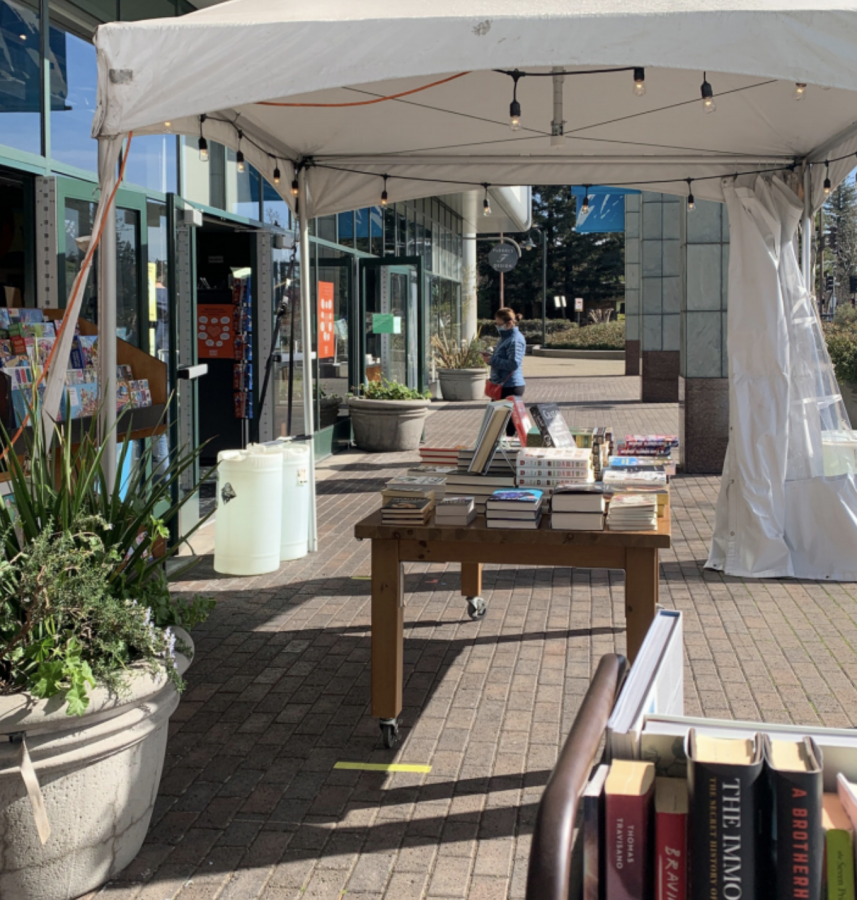Top Picks From Print: Downtown Menlo Park Businesses Battle the Pandemic
Books sit outside open windows and doors of Kepler’s Books as a form of health safety measures. Restaurants and other businesses in downtown Menlo Park have had to rethink their normal business models amid the pandemic. Staff photo: Carly McAdam.
February 18, 2021
Note: This story originally appeared in the 47.3 print edition of The Coat of Arms in February 2021.
———
In the midst of the global pandemic and government-imposed restrictions, many downtown Menlo Park businesses are fighting to adapt to the tectonic changes and retain their employees.
For example, running apparel store Fleet Feet in downtown Menlo Park has seen a 29% decrease in business since 2019, the independently-owned franchise’s owner Lisa Taggart said to The Coat of Arms. While sales were initially down 75% in March, at the beginning of the shutdown, the ability to partially reopen to in-person customers allowed the business to begin to recover, according to Taggart. With the partially reopened store, all customers and staff are required to wear masks, customer temperatures are checked upon entry and the number of customers in the store is limited to 25% of the original capacity while San Mateo County continues to be in the most severe health risk level, known as the Purple Tier.
Kepler’s Books similarly struggled as a result of the shutdown with the on-site bookstore remaining closed from mid-March through August 2020, according to Praveen Madan, Kepler’s Books CEO and Kepler’s Literary Foundation Board Member. During that period, Kepler’s revenues were down by as much as 55% compared to the same period in 2019, with most of sales originating from Kepler’s website, Madan said.
Similarly, dry cleaners Hoot ‘N Toot’s business is down 33%, Store Manager Yooseon Hwang said to The Coat of Arms, and toy store Cheeky Monkey’s business is down 20% from 2019, according to Cheeky Monkey owner Anna Chow.
For businesses like Cheeky Monkey, government guidelines have forced the majority of their business online, Chow said. While Cheeky Monkey’s website previously was not a core part of their business. Once Cheeky Monkey had to close down to the public, the Cheeky Monkey experience shifted completely online, according to Chow. When COVID-19 restrictions allow the business to open, regulations are put in place as to how many people can be in the store at once, depending on San Mateo County’s COVID-19 severity tier.
Disruptions in the supply chain additionally hurt Cheeky Monkey’s business, according to Chow. Many toys that Cheeky Monkey sells are made in China, and transport has been slowed because of the pandemic, she said.
Supply chains have also been disrupted for restaurants such as Left Bank, according to Left Bank Sales and Events Manager Rayane Abi Abboud. The Santa Cruz Avenue restaurant, whose revenue is down around 60% since the start of the pandemic, has shifted from their “lively French” dine-in atmosphere to only to-go orders with outdoor dining banned during the San Mateo County stay-at-home order. “We had to transform what we do [at Left Bank] into a box and make it exciting for guests to take home and enjoy,” Abi Abboud said.
As Left Bank is currently making 40% of its 2020 revenue solely from to-go food, the restaurant plans to keep the to-go option in place post-pandemic, according to Abi Abboud.
Another downtown restaurant, The Refuge, has also been forced to focus on to-go food, according to owner Matt Levin. “We basically turned [our business model] inside out,” Levin said.
The Refuge has had a similar 50% decline in revenue at its downtown Menlo Park location and a 40% decline in revenue at its San Carlos location, forcing Levin to halt construction on a third location in Hillsdale. “We basically work to pay my team’s salaries, just to keep people present, just to keep it alive,” Levin said.
Before the pandemic, The Refuge had 70 employees across both locations, yet the restaurant is now working with a “skeleton crew” of 12 to 15 employees, including Levin and his wife, co-owner Melanie Roth. Levin highlighted the dedication and great work of his employees throughout the pandemic.
Levin expressed the difficulties of working with a small number of employees, especially when one has symptoms of the coronavirus or has had an exposure to the virus. “It’s super difficult because you can’t just call [a new employee] in for two weeks [while another employee is quarantining],” Levin said. He also stated that some of the employees he had to let go have been receiving unemployment benefits, and others have started doing delivery jobs through companies such as DoorDash and Uber Eats.
Chow similarly let her part-time employees go upon learning that they would be eligible for additional unemployment compensation from the government.
Nonetheless, Chow has enabled her full time employees to decide whether they want to work at Cheeky Monkey at the store or from home due to health issues. Employees at the store work with in-person customers and fill orders, while employees working from home add products to the website and handle purchasing.
“We’re doing everything we can to make sure we keep all of our full time employees employed so that they have a job as well as health insurance. That’s critically important to us,” Chow said.
“It’s important for people to understand the difference between those who have jobs where they can work from home and those who have jobs that require them to leave home,” Chow said. “People come into the store, and because it’s not their day-to-day experience of coming out of their homes, they expect things to be the same in the store sometimes, and they just aren’t.”
Levin voiced frustration at the state’s fluctuating permission to open, especially after purchasing outdoor dining equipment. “It’s really hard to turn around a moving ship. It takes a massive amount of coordination and effort to work with state mandates, usually with little or no notice,” Levin said.
Levin also advocated for the opening of outdoor dining. “Shutdowns don’t work. [It is important to get] people out into the air and let them go to an environment where the staff are trained to follow health protocols and standards, which are restaurants. “[Restaurants] are one of the safer places to go,” Levin said.
Madan, however, viewed California’s implementation of restrictions and shutdowns as too haphazard. “[In May and June 2020, California] Governor Gavin Newsom foolishly rushed into reopening too quickly and failed to control the pandemic, leading to thousands of unnecessary deaths and much suffering since then,” Madan said. Madan wrote an open letter to Newsom in August, urging further restrictions.
Madan additionally expressed disappointment in California’s pace of administration of the COVID-19 vaccine. “The state is failing to administer [the vaccines] expeditiously. This is evidence of pure incompetence especially since they had months to prepare for this,” Madan said.
Taggart similarly criticized the federal government’s handling of the pandemic. “The lack of effort, abdication of responsibility, at the federal level cost thousands and thousands of lives. And this is a terrible tragedy; the worst I hope to witness in my lifetime,” Taggart said.
Still, the economic aid from the government helped some businesses stay open. Fleet Feet’s business loan through the U.S. Small Business Association (SBA) was forgiven for six months under the CARE Act, and the business also received a Paycheck Protection Program (PPP) loan, which aims to help businesses continue to pay their employees through the pandemic, according to the SBA website. “If we hadn’t had that, we would have felt on the brink,” Taggart said.
Cheeky Monkey similarly received a PPP loan, which “helped tremendously,” according to Chow. She also emphasized the impact of the community’s support during November and December, with individuals and nonprofit toy drives choosing to shop at Cheeky Monkey instead of big box stores. Customers similarly rallied around Fleet Feet, with friends of Taggart purchasing shoes from the store from the East Coast, according to Taggart.
Levin too highlighted The Refuge’s interaction with the community as a key reason the business has remained open. “This is obviously not going to be a record breaking year or anything like that, but people can have something they can go to and spiritually lift themselves through coming to us. We’re actually living up to our name at this point,” Levin said. Still, Levin remains hopeful. “[We] always believe we can find a way up and out,” Levin said.




